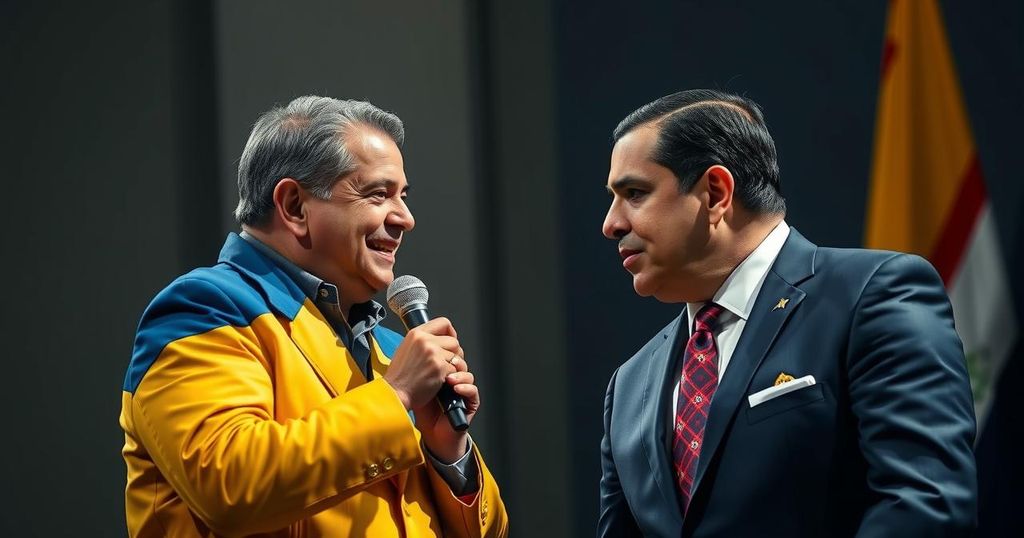Venezuelan Opposition Leader Urges Colombia’s President to Acknowledge Electoral Victory

Venezuelan opposition leader Maria Corina Machado urged Colombia’s President Gustavo Petro to recognize her faction’s victory in the disputed July presidential election. During a virtual address to the Colombian Senate, she called for increased international pressure on Nicolás Maduro to step down, asserting the need for action against the current regime. Machado highlighted the repression faced by the opposition and warned of regional implications if Maduro remains in power, all while remaining in hiding due to safety concerns.
Maria Corina Machado, a prominent leader of the Venezuelan opposition, has formally appealed to President Gustavo Petro of Colombia to recognize the alleged electoral victory of her coalition in the contentious July presidential election held in Venezuela. During a virtual presentation to the Colombian Senate, Machado’s intention was to galvanize international pressure on Venezuelan President Nicolás Maduro to resign prior to January 2024. Given her precarious situation, having evaded arrest for two months, Machado pronounced that the Colombian government must respond decisively to the ongoing crisis in Venezuela, stating, “Silence is no longer an option in the face of what is happening in Venezuela.” She articulated her belief in a necessary political transition and expressed readiness for negotiations that respect the will of the Venezuelan electorate as expressed in the July elections. The electoral authorities, aligned with Maduro’s party, proclaimed Maduro as the victor immediately after the polls closed; however, they refrained from releasing specific voting tallies, attributing this lack of transparency to a cyber attack. Conversely, Machado’s opposition coalition successfully acquired vote tally sheets from over 80% of the electronic voting machines and disseminated these results publicly, indicating a significant victory for opposition candidate Edmundo González. In her address to Colombian senators, Machado emphasized the critical role their support could play in fostering governmental transition in Venezuela. She stated, “To you, honourable senators, I ask you to be guarantors of our victory and to be the voice of those of us who today are facing the most atrocious and ruthless repression.” Furthermore, she highlighted the oppressive actions of Maduro’s government that have emerged in the aftermath of the election, including detentions and allegations of torture involving minors. Machado also articulated concerns regarding the broader implications for Colombia if Maduro’s regime persists for another term, warning that Venezuela has increasingly served as a refuge for criminal guerrilla factions originating from Colombia. This escalates the complexity of President Petro’s policy objectives, which primarily focus on establishing peace agreements with Colombian rebel entities entrenched along the Venezuelan frontier. Following the elections, President Petro, alongside Brazilian President Luiz Inacio Lula da Silva and former Mexican President Andrés Manuel López Obrador, endeavored to mitigate the electoral turmoil in Venezuela; however, their attempts were thwarted as Maduro reinforced his position by reshuffling his cabinet and apprehending over 2,000 adversaries. Edmundo González, a former diplomat and opposition candidate, had to flee Venezuela for Spain in September after facing an arrest warrant related to the dissemination of voting results online. Concurrently, Maduro’s administration has positioned itself as a negotiator in peace processes involving Colombian rebel factions, although discussions with the National Liberation Army have faltered. Venezuela is poised to commence a new presidential term on January 10, and Machado is actively pursuing international backing against the Maduro administration while maintaining a low profile due to safety concerns.
The Venezuelan political landscape has been fraught with contention, particularly surrounding the legitimacy of electoral processes and the ruling government’s tactics to suppress dissent. Maria Corina Machado’s opposition faction claimed victory in the July presidential election, leading to a significant call for international acknowledgment and support. The situation is critical not only for Venezuela but also for Colombia, given the implications of Maduro’s governance on regional security, especially regarding armed groups that affect Colombia’s frontier. The backdrop of ongoing negotiations for peace and the rising tensions following the disputed elections highlight an increasingly volatile socio-political atmosphere.
In conclusion, Maria Corina Machado’s appeal to Colombian President Gustavo Petro underscores the urgent need for international recognition of the Venezuelan opposition’s claimed electoral victory. The deteriorating situation in Venezuela, marked by allegations of repression and instability, poses significant threats to regional security and peace initiatives in Colombia. The response of Colombia and other international actors will be pivotal in influencing the future political trajectory in Venezuela as the crisis unfolds.
Original Source: www.oneindia.com







